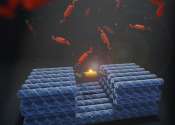Another step toward synthetic cells
Building functional synthetic cells from the bottom-up is an ongoing effort of scientists around the globe. Their use in studying cellular mechanisms in a highly controlled and pre-defined setting creates great value for ...









